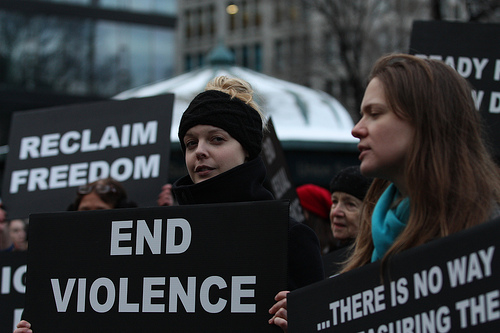I can’t count the number of times “chill” adults (i.e. not my parents) told me that “grades don’t matter” when I was in school. Sure, that’s true enough for those who don’t pursue additional education, but if I were to apply to graduate school tomorrow, my GPA would matter a whole lot more than it does today. Grades do matter, often more than they should, and often without consideration for extenuating circumstances that can result in huge blemishes on transcripts — like sexual assault.
At the Washington Post, Harvard Law School Gender Violence Program fellow Cari Simon describes the ways in which university administrations’ failures to address campus sexual violence can adversely affect the academic and professional futures of assault survivors, who can receive little to no help addressing their abuses in any capacity. There is no national statistical information detailing the impact of sexual assault on grades, but, as Simon points out, firsthand accounts show that many, many survivors — primarily women and LGBTQ students — suffer serious declines in GPA:
One in five women are sexually assaulted in college, according to a White House report. The rates are also particularly high in the LGBT community. In the aggregate, this means that millions of college women and LGBT students have seen their grade-point averages unfairly deflated due to sexual violence. As one of my clients bluntly put it, “it’s as if my transcript is covered in his semen.” …
These deflated GPAs have a rippling negative impact on survivor’s graduate school options and access to professional opportunities. Those lost opportunities are devastating on a micro-level — individual students miss out on what they had worked hard to achieve.
The loss of opportunity does not just affect individual survivors, though. As happens in STEM careers — which have seen little female advancement, likely because of widespread sexual abuse in field research across disciplines — when sexual assault survivors are not fairly afforded an opportunity to excel, society at large is robbed of whatever good could have been. In Simon’s words, we are “osing out on the contributions that these students would have made had they been able to start off in professional careers and attend graduate schools that are reflective of their merits, not their rape.”
There are a few ways to address the problem, which fall on undergraduate and graduate institutions — not just on survivors, as has historically been the case. First, Simon suggests, colleges and universities can offer undergraduate survivors the opportunity to restore their academic records in instances where students have gone without support for their assaults and already seen their grades suffer. What’s more, institutions should work to prevent such downturns: When a student’s grades suddenly take a turn for the worse, it’s usually a sign of something wrong. Given the high rate of sexual violence on college campuses, rape is unfortunately never out of the question as a cause.
Graduate programs, too, should understand this, and afford survivors the opportunity to address sexual violence and resulting academic issues in their applications — without having their victimhood used against them. As Simon notes, plenty of survivors are able to get past damaging sexual assaults without suffering blows to their GPAs as well. But it’s not something they should have to worry about; avoiding an academic nightmare and shattered future in the wake of sexual assault should not be so difficult. It’s up to colleges and universities to make it easier.

